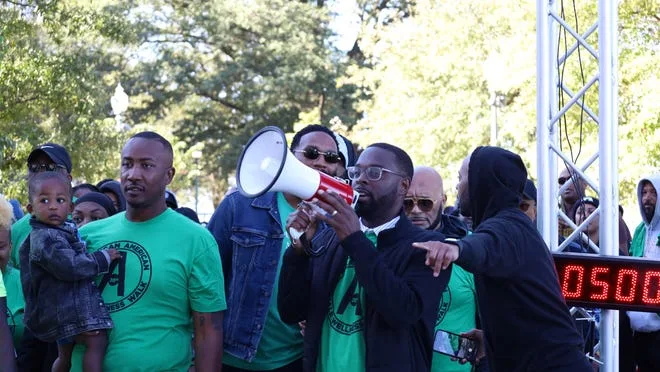Newly elected Memphis Mayor Paul Young and Memphis Basketball coach Penny Hardaway joined dozens of 5K runners on Saturday in the third annual Memphis Walk to Save Black Men’s Lives Saturday at Fourth Bluff Park.
More than just a 5K, the event offers multiple health screenings free of charge, including blood pressure, glucose, eye exams, cholesterol, sexually transmitted infections, prostate cancer and more.
Hardaway emphasized that stigmas in the Black community surrounding testing and health checkups need to end.
“You know a lot of the time, being from the neighborhood (myself), African American males do not want to get checkups, they don’t want to come and check their cholesterol… anything really,” Hardaway said. “And there’s kind of a fear of understanding what’s going on with us, and we need to know. We have 500,000 African Americans in this city, and we need to get as many as we can out here to take the screenings, make them feel comfortable, and see where their health is.”
Mayor-elect Young took to the microphone moments before the walk began, thanking event organizers and encouraging people to get screened.
“Memphis, this is really really important,” Young said. “As a Black man I know how easy it is to just say ‘I’m gonna worry about it tomorrow,’ but tomorrow might not come if we don’t go get these screenings. There’s often… very easy things that we can do to stay alive, and our young people need our Black men to stay alive and thrive in our communities and our city.”
Created in 2004, the African American Male Wellness Agency visits more than 16 cities annually, providing over 4,000 free health screenings yearly. According to AAWA, Black men have an average life span 12 years shorter than White men. To bridge that gap, the organization aims to take “a stance to reduce disparities in premature death and chronic diseases among African American males,” and erase stigmas surrounding men’s health.
“I think it’s really important especially for them to have the opportunity to be screened, to get the health testing they need that’s sometimes not offered or taken seriously,” said Marquisha Williams, a 5K attendee. “It’s important for us to be able to stick around and be here for generations to come.”
A few dozen local organizations were present at the event doing giveaways, running COVID-19 tests and offering screenings and other services, including colleges like the University of Tennessee Health Science Center, the University of Memphis College of Nursing, and Christian Brothers University. Companies such as Johnson & Johnson, Regional One, Cigna, the YMCA and others did the same, all free of charge.
Some came out to the 5K not just to support the cause and get screened, but to enjoy the cool Memphis weather, which was a brisk 50 degrees Saturday morning. Chris Collins, who walked the 5K, said he was ready to get some exercise in early.
“It’s a good beautiful sunny morning here in Memphis, what better way to get out here and start the day exercising. Hopefully it doesn’t take me too long to finish this,” Collins said, laughing. “It’s a great cause out here raising awareness about men’s health.”
Importantly, events like this serve as a reminder that treating a chronic disease or condition has to begin with identifying it in the first place.
“The cause is a good cause. We’re trying to raise awareness on biometric screenings for primarily African American people but for all,” said 5K attendee Daniel Webber. “It’s super important to know those numbers because you can catch a chronic disease like heart disease or type 2 diabetes just simply by knowing your numbers. So as for providing that resource to the public I think that’s a really good cause.”
Young echoed the sentiments of Hardaway, runners and event organizers alike − the walk’s attendance must continue to grow.
“We got a lot of work to do in our city, and Black men are going to be a big part of getting where we want to go, but we got to be alive to get there.”
Jacob Wilt is a reporter for The Commercial Appeal. You can reach him atjacob.wilt@commercialappeal.com


